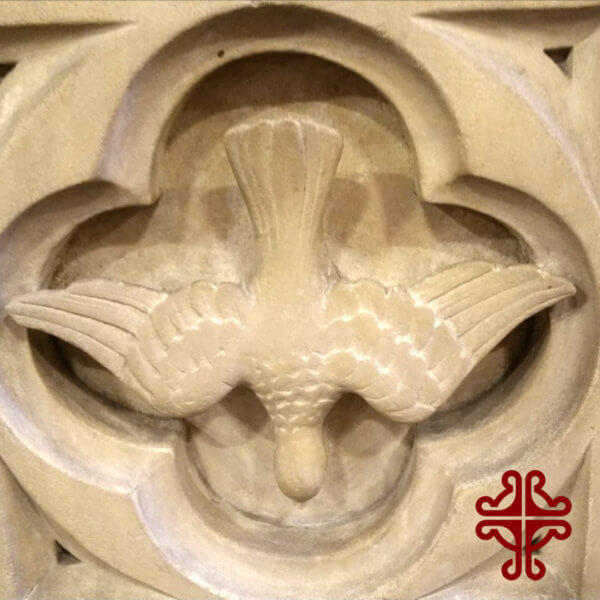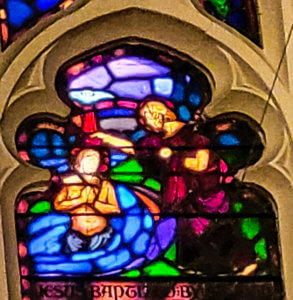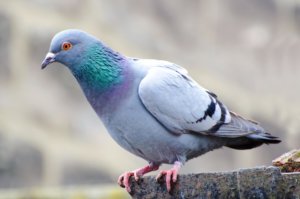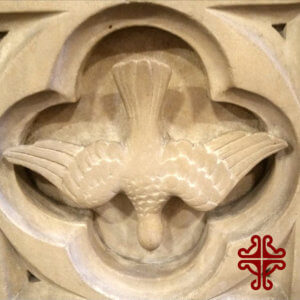
“Like a Dove”
Good morning. Please pray with me. May the words of my mouth, and the meditations of all our hearts, be acceptable to you, Oh Lord, our rock and our redeemer. Amen.
In Luke’s gospel, John the Baptist recognizes Jesus as Messiah, and passes on the good news to his mother, before either of them is even born. “‘And why has this happened to me,'” Elizabeth exclaims in wonder to Mary, “‘that the mother of my Lord comes to me? For as soon as I heard the sound of your greeting, the child in my womb leaped for joy.'”[i]
In John’s gospel, it takes John the Baptist much longer to figure out who Jesus is. John is a grown man, perplexing the priests and Levites of Jerusalem by baptizing people at the Jordan river, giving cryptic answers to questions about who he is and what he’s doing. All he knows is that someone is coming – is in fact already among them – and that he is “unworthy to untie the thong of [this person’s] sandal.”[ii]
 A day later, John the Baptist recognizes Jesus. It’s a two-step process. First, God tells John what to look for. “‘I myself did not know him,'” John testifies, “‘but the one who sent me to baptize with water said to me, ‘He on whom you see the Spirit descend and remain is the one who baptizes with the Holy Spirit.'” Second, John sees “‘the Spirit descending from Heaven like a dove, and it remained on him.'” The Spirit descended, the Spirit remained, and all became clear: “’I myself have seen and have testified that this is the Son of God.'”[iii]
A day later, John the Baptist recognizes Jesus. It’s a two-step process. First, God tells John what to look for. “‘I myself did not know him,'” John testifies, “‘but the one who sent me to baptize with water said to me, ‘He on whom you see the Spirit descend and remain is the one who baptizes with the Holy Spirit.'” Second, John sees “‘the Spirit descending from Heaven like a dove, and it remained on him.'” The Spirit descended, the Spirit remained, and all became clear: “’I myself have seen and have testified that this is the Son of God.'”[iii]
John’s recognition of Jesus triggers a flurry of realignments. Two of John’s own disciples set off after Jesus. “‘What are you looking for?'” Jesus asks them. They respond with a question: “‘Rabbi, … where are you staying?'” “‘Come and see,'” he says, and they do. One of the disciples, Andrew, collects his brother, Simon Peter, and brings him along too. They all descend on Jesus, and on whatever household was fool enough, and blessed enough, to be hosting him, and they “remained with him that day.”[iv] Like the Spirit, they descend, and they remain. I picture a whole flock of doves, stirred by some sudden warning or newsflash only they can hear, scattering upward, rearranging themselves, and fluttering back down in a new configuration, settling their wings.
It’s a lovely image, isn’t it? The Spirit, descending like a dove …
Unless, of course, you’ve ever actually had a dove descend on you.
 Because doves, my friends, are pigeons. I have it on excellent authority: Paul Sweet, the collection manager for the department of ornithology at the American Museum of Natural History, confirmed it in an interview. Doves, pigeons; tomato, tomahto. “[B]oth … refer to the 300-plus species of birds in the Columbidae family.”[v] I live in New York, and let me tell you, if anything tried to descend on me “like a pigeon,” I wouldn’t be standing still, waiting for it to land. The only thing flapping harder than the pigeon would be me.
Because doves, my friends, are pigeons. I have it on excellent authority: Paul Sweet, the collection manager for the department of ornithology at the American Museum of Natural History, confirmed it in an interview. Doves, pigeons; tomato, tomahto. “[B]oth … refer to the 300-plus species of birds in the Columbidae family.”[v] I live in New York, and let me tell you, if anything tried to descend on me “like a pigeon,” I wouldn’t be standing still, waiting for it to land. The only thing flapping harder than the pigeon would be me.
Now, of course we can speculate that the dove John the Baptist had in mind was one of the nicer members of the Columbidae family, not one of the thugs that colonized the balcony of my mother’s sixteenth-floor apartment, or the rude bird that descended on my husband as if he were a highway rest stop and thus caused us to be late to the only movie premiere I’m ever likely to be invited to in my life.
But I don’t think we should domesticate John the Baptist’s dove, or hyper-sanitize it, the way we do with lambs or piglets in children’s picture books. When John says he saw the Spirit descend “like a dove,” let’s let that be a little unsettling. After all, wouldn’t it be? If the testimony of the Hebrew prophets is any guide, being filled with the Spirit is a profoundly discomfiting experience. If we let John’s simile breathe a bit, let it out of the pretty dove-shaped box we’ve made for it, maybe we can sense something of the wonder John felt when he saw the Spirit not only descend on Jesus, but remain on him.
 When I let John’s dove be a dove, it’s the remaining that strikes me. The Spirit descended like a dove, and Jesus allowed it to land. He didn’t run for cover, or flap his arms, or shake his fists, or yell “Swine bird” at it like Peter Sellers in The Return of the Pink Panther. On a more serious note, Jesus didn’t do what Jonah did, when God asked him to go to Niniveh; he didn’t do what we all do, when God gives us a nudge towards something that troubles our comfort. Jesus let the Spirit descend and remain. And then, when the disciples descended on him, he let them remain, too, until, at last, he breathed the Holy Spirit into them and sent them forth into the world.[vi]
When I let John’s dove be a dove, it’s the remaining that strikes me. The Spirit descended like a dove, and Jesus allowed it to land. He didn’t run for cover, or flap his arms, or shake his fists, or yell “Swine bird” at it like Peter Sellers in The Return of the Pink Panther. On a more serious note, Jesus didn’t do what Jonah did, when God asked him to go to Niniveh; he didn’t do what we all do, when God gives us a nudge towards something that troubles our comfort. Jesus let the Spirit descend and remain. And then, when the disciples descended on him, he let them remain, too, until, at last, he breathed the Holy Spirit into them and sent them forth into the world.[vi]
How do we react when the Holy Spirit makes a move in our direction? Do we allow the Spirit descend and remain on us, even for a little while?
I’d like to suggest that this particular weekend offers an excellent opportunity to consider the question. Because I think it’s at least possible that the Spirit spoke to us – is still speaking to us – through the life and work of Reverend Doctor Martin Luther King, Junior. Abraham Joshua Heschel, the renowned scholar of the Hebrew prophets, thought so. Here is Rabbi Heschel, ten days before Dr. King was assassinated, introducing him to a conference of the Rabbinical Assembly:
Where in America today do we hear a voice like the voice of the prophets of Israel? Martin Luther King is a sign that God has not forsaken the United States of America. God has sent him to us. His presence is the hope of America. His mission is sacred, his leadership of supreme importance to every one of us.
… I call upon every Jew to harken to his voice, to share his vision, to follow in his way. The whole future of America will depend upon the impact and influence of Dr. King.[vii]
 “’The Spirit descend[ed] from heaven like a dove.’”[viii] As we remember Dr. King, there’s a temptation to tame his vision, domesticate it. We hear the familiar excerpts from his speech on the Capitol steps, and we respond with an upswelling of emotion, an agreeable “Yes! Yes! I have that dream, too!” There’s nothing wrong with this, as far as it goes. But if we stop here, we’ve done little more than put Dr. King into a pretty, dove-shaped box. And this is arguably even worse than running for cover as the dove descends, or waving our fists. “Shallow understanding from people of good will,” Dr. King himself wrote, “is more frustrating than absolute misunderstanding from people of ill will. Lukewarm acceptance is much more bewildering than outright rejection.”[ix]
“’The Spirit descend[ed] from heaven like a dove.’”[viii] As we remember Dr. King, there’s a temptation to tame his vision, domesticate it. We hear the familiar excerpts from his speech on the Capitol steps, and we respond with an upswelling of emotion, an agreeable “Yes! Yes! I have that dream, too!” There’s nothing wrong with this, as far as it goes. But if we stop here, we’ve done little more than put Dr. King into a pretty, dove-shaped box. And this is arguably even worse than running for cover as the dove descends, or waving our fists. “Shallow understanding from people of good will,” Dr. King himself wrote, “is more frustrating than absolute misunderstanding from people of ill will. Lukewarm acceptance is much more bewildering than outright rejection.”[ix]
What if, instead, we were to sit still, amid the flutter of wings, and allow the dove to descend on its own terms? Allow it to trouble us as it lands? Allow it to remain on us, at least for a little while?
Perhaps each of us, this weekend, could allow Dr. King to speak to us in words we haven’t heard dozens of times before. One place to start would be to read his “Letter from Birmingham Jail,” a stinging rebuke to white Christian ministers for their failure of love and courage.[x] Another would be to read one of his speeches on economic injustice. “[T]here are literally two Americas,” Dr. King wrote.
One America is flowing with the milk of prosperity and the honey of equality .… [But] there is another America, and that other America has a daily ugliness about it that transforms the buoyancy of hope into the fatigue of despair …. By the millions, people in the other America find themselves perishing on a lonely island of poverty in the midst of a vast ocean of material prosperity…. This country has socialism for the rich, rugged individualism for the poor.”[xi]
Both of these speeches are available online; they also are reprinted in The Radical King, an excellent collection edited by Cornel West.[xii] We may find ourselves nodding along as we read; we may find ourselves tossing the book aside in frustration or worse. But isn’t that what happens when you read Jeremiah? Amos? “He made my mouth like a sharp sword,” Isaiah says.[xiii] There’s no reason to expect a prophet’s words to make comfortable reading. And why should we be comfortable? According to the Brookings Institution, the typical white family in America has ten times the wealth of the typical black family.[xiv] According to a report delivered to the United Nations by the Sentencing Project in 2013, one out of three black boys born in the United States today can expect to spend time in prison.[xv]
But if we sit still and allow the Spirit to descend and remain, for at least a little while, we also may receive Dr. King’s version of the good news that brings us all together – the good news John the Baptist delivered, the good news we celebrate this morning and every time we gather in the name of love.
When our days become dreary with low-hovering clouds of despair, and when our nights become darker than a thousand midnights, let us remember that there is a creative force in this universe working to pull down the gigantic mountains of evil, a power that is able to make a way out of no way and transform dark yesterdays into bright tomorrows.
Let us realize that the arc of the moral universe is long, but it bends toward justice.[xvi]
Amen.
Bibliography
The New Oxford Annotated Bible: New Revised Standard Version with the Apocrypha, Fourth Edition. New York: Oxford University Press, 2010 (Kindle edition).
“Conversation with Martin Luther King,” Conservative Judaism 22, No. 3 (Spring, 1968), 1-19. Accessed digitally at https://gendlergrapevine.org/wp-content/uploads/2013/06/Conversation-with-Martin-Luther-King.pdf.
King, Martin Luther, Jr. “Letter from Birmingham Jail,” in Cornell West, ed., The Radical King, 127-45. Boston: Beacon Press, 2015.
—. “The Other America,” in West, ed. The Radical King, 235-51.
—. “Where Do We Go From Here?” in West, ed. The Radical King, 161-80.
McDonald, Hannah. “What’s the Difference Between Pigeons and Doves?” Mental Floss, August 17, 2018, updated September 15, 202. Accessed on the Mental Floss website, January 6, 2023. https://www.mentalfloss.com/article/554182/what-is-difference-between-pigeons-and-doves.
McIntosh, Kristen, et al. “Up Front: Examining the Black-White Wealth Gap,” February 27, 2020. Accessed on the Brookings website, January 6, 2023. https://www.brookings.edu/blog/up-front/2020/02/27/examining-the-black-white-wealth-gap/.
The Sentencing Project. “Report of The Sentencing Project to the United Nations Human Rights Committee Regarding Racial Disparities in the United States Criminal Justice System.” August 2013. Accessed on the Sentencing Project website, January 6, 2023. http://sentencingproject.org/wp-content/uploads/2015/12/Race-and-Justice-Shadow-Report-ICCPR.pdf.
[i] Lk 1:39-44.
[ii] Jn 1:19-28.
[iii] Jn 1:29-34.
[iv] Jn 1:35-42.
[v] McDonald, “Pigeons and Doves.”
[vi] Jn 20:19-23.
[vii] “Conversation with Martin Luther King,” p. 1.
[viii] Jn 1:32.
[ix] King, “Letter from Birmingham Jail,” p. 135.
[x] King, “Letter from Birmingham Jail.”
[xi] King, “The Other America,” 236-7.
[xii] West, ed., The Radical King.
[xiii] Isaiah 49:2.
[xiv] McIntosh, “The Black-White Wealth Gap.”
[xv] Sentencing Project, p. 1.
[xvi] King, “Where Do We Go From Here,” 180.
